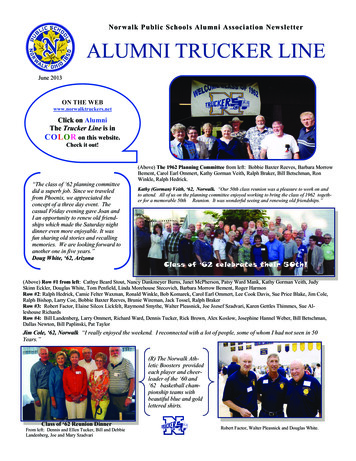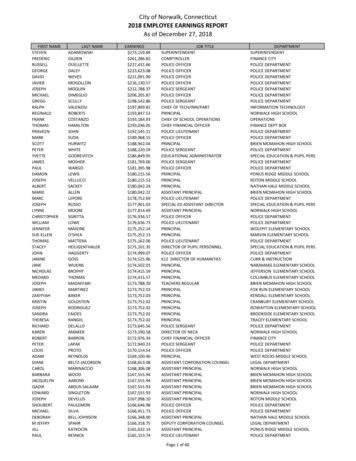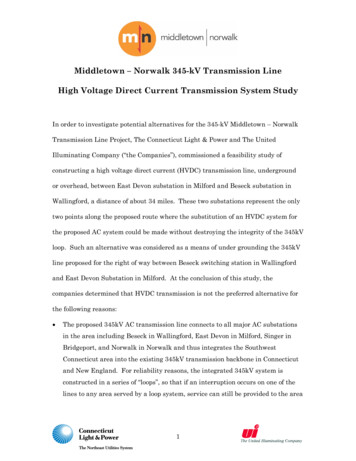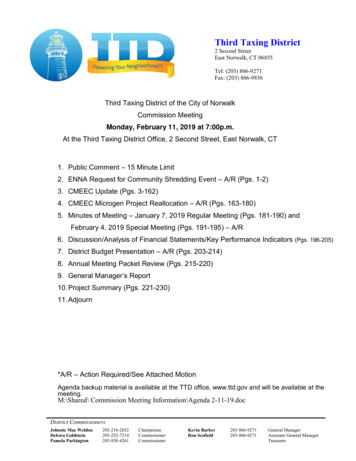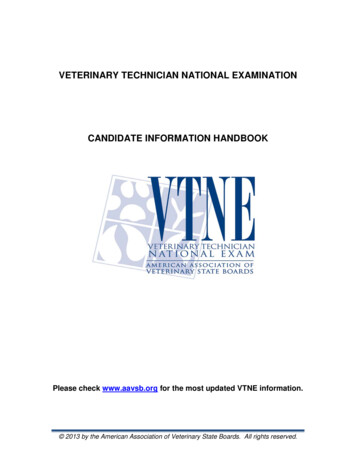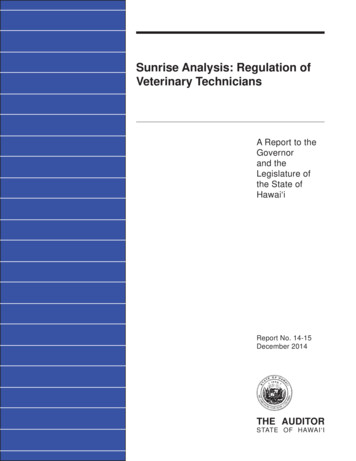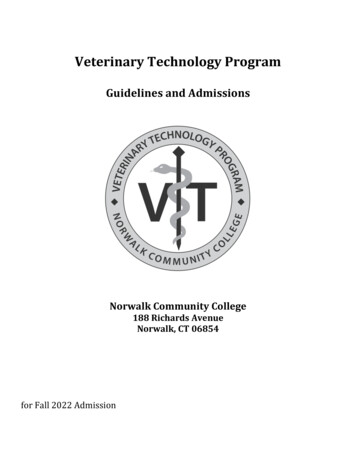
Transcription
Veterinary Technology ProgramGuidelines and AdmissionsNorwalk Community College188 Richards AvenueNorwalk, CT 06854for Fall 2022 Admission
Table of ContentsWelcome! . 3Frequently Asked Questions. 4Check List for Veterinary Technology Program (VTP) Application . 6Additional Requirements and Information . 10Helpful Resources . 10NCC Veterinary Technology Program of Study . 11NCC Veterinary Technology Course Descriptions . 11Veterinary Technology Program Application. 15Guidelines for Writing Your Personal Statement . 17Mid-term/interim grade report for prerequisite courses . 18Medical Authorization To Participate In The VTP . 19Veterinary Technology Technical Standards . 20Transcript Evaluation Request . 21Veterinary Technology Application Ranking . 23
WelcomeWelcome to the Norwalk Community CollegeVeterinary Technology A.S. Degree ProgramDr. Liegey and Professor RamosProgram Coordinator and Clinical CoordinatorDear Prospective Student,Congratulations, you have embarked on your first step into enter the rewarding field of veterinary medicine. Thededicated staff of Norwalk Community College, and specifically the Veterinary Technology Faculty and Staffare enthused about your inquiry into the program and are excited about the opportunities we have planned foryou. We are all committed to offering you as much support as possible to help you be successful in thisendeavor.We are eager to train compassionate and skilled veterinary technicians for immediate employment in the field ofveterinary medicine in Connecticut, New England and the global community. We will strive to do so with thesupport of our colleagues and faculty in a supportive, progressive environment that offers students the bestopportunity for success and treats our animal companions with kindness and respect. We have a Live AnimalLab on campus where we are privileged to work with healthy animals belonging to faculty, staff and students.We are also fortunate to have relationships with many local veterinary clinics, farms and shelters that will besharing their facilities and their animals with you during your training.Our goal is to help you realize your potential as an outstanding veterinary team member, should you choose thiscareer. You will gain an understanding of cutting edge veterinary medicine as well as the skills necessary to be apositive, committed and reliable colleague and lifelong learner. As part of the requirement of the VeterinaryTechnology accrediting body (the American Veterinary Medical Association’s Committee on VeterinaryTechnology Education and Activities) you will acquire over 300 skills in areas including nursing, management,hematology, cytology, animal nutrition, parasitology, dentistry, radiology, pharmacology, anesthesiology, andmore. Veterinary Technology is a rigorous program that demands commitment from both students and faculty.We look forward to working with you. Please don’t hesitate to reach out with questions as you begin your newjourney.Sincerely,Catherine Liegey D.V.M.for fall 2022 Admission(Letter adapted from Dr. Anne Hermans)3
Frequently Asked QuestionsWhat is Veterinary Technology?Veterinary Technology is a rapidly growing profession with exciting opportunities for qualifiedindividuals. Specialty and referral small and large animal veterinary practices, wildliferehabilitation facilities and zoos, shelters, farms, research laboratories and animal food industry arejust a few of the employers that actively recruit credentialed veterinary technicians.What are the opportunities for Veterinary Technicians?Veterinary technicians are highly trained and educated members of a veterinary healthcare team.They are greatly valued for their knowledge and their critical thinking skills. No longer responsiblesolely for animal restraint, their tasks may include: client communication, nursing care, laboratorydiagnostics, radiography, anesthesiology, surgical nursing, and management. Many veterinarytechnicians are placed in a supervisory role in veterinary practices, research institutions and otheremployment options. In addition, there are recognized specialties for veterinary technicians whowish to attain a higher level of recognition in specific disciplines. After completing the 2-year A.S.degree, students may also transfer into pre-veterinary or other 4-year degree programs.What do Veterinary Technicians Earn?The annual mean wage for a credentialed veterinary technician in CT is 49,900. Entry levelwages are expected to be lower. The profession’s projected growth is 19% from 2018 to 2028(Bureau of Labor Statistics, fall 2019).What are the licensure requirements for becoming aCredentialed Veterinary Technician (CVT)?A growing number of states (not currently including CT) require veterinary technicians to belicensed, registered, or certified. Passing the Veterinary National Technician Examinations(VTNE) is an important step in professional recognition and VTNE Results are recognized in the USand Canada. To be eligible to sit for the VTNE, students must have graduated from an AVMAaccredited Veterinary Technology program. It is the expectation of the program that all NCCgraduates will take the VTNE boards. There is now voluntary credentialing in CT administered bythe Connecticut Veterinary Technician Association.What type of degree will I receive?Upon successful completion of the program, graduates receive an Associate of Science in VeterinaryTechnology.Is the program accredited by the AVMA?The VTP received initial AVMA-CVTEA accreditation effective September 16, 2016. Studentsgraduating from the VTP will be eligible to take the VTNE.Is this a part time or full time program?The program is designed as a full-time degree program that may be completed in 2 years bystudents who have completed all the prerequisites. Veterinary Technology courses areacademically demanding and require 2-3 hours of study a week for every credit hour taken. It is notfor fall 2022 admission4
possible to work full time and be successful in the VTP. You may choose to complete all generaleducation requirements on a part-time basis in the first year and then progress through thetechnical education (VTP) classes. Once a student is admitted to the program, s/he has a maximumof three years to complete the program.Can I start any time?Enrollment into the Veterinary Technology program is for the fall only, and most courses must betaken in sequence. However, you may complete prerequisites and core requirements during anysession. In addition, the courses VET 101 (Introduction to Veterinary Technology) and VET 125(Veterinary Medical Terminology) may be taken when offered without admission into the VTP;eligibility for ENG 101 (or ENG 101W) is the only prerequisite. Prior math and science courseworkwould help you as they are pre-professional courses. Please note that VET 100 (Introduction toAnimal Care) is only open to students who have been admitted to the VTP.Who is my advisor?Once you have been admitted to the Program, your advisor will be:*Catherine R. Liegey, D.V.M.Program Coordinator(203) 857-7364Cliegey@norwalk.eduIf you are completing prerequisites for the Program, you will be advised by theStudent Success Center or the Counseling Center: *Student Success Center(203) 857-7234Counseling Center(203) 857-7033If you have questions about eligibility for the GAP articulation program with UConnand have fewer than 30 credits, you will be advised by Karla Lara:203-857-6919klara@norwalk.eduIf you have questions about Vet Tech Admissions, direct them to Robin Morris:*203-857-6971rmorris@norwalk.edu*Please be sure to read through this packet of information thoroughly before contactingcounselors, advisors or faculty. Please note that FERPA regulations prohibit NCC faculty andstaff from discussing academic plans with any person other than the student.This information is subject to change at any time.Please consult the program’s administration for the latest updates.for fall 2022 admission5
Check List for Veterinary Technology Program (VTP) ApplicationThe VTP Application Process Overview:Admissions Deadline for admittance fall 2022: Tuesday March 22nd, 2022. Applicationsreceived after March 22nd will be considered on a space and resource available basis. Allapplications will be held for review beginning March 23rd. You may expect to be notifiedwithin 2-3 weeks. Please retain a copy of all materials submitted.Veterinary Technology is a selective admissions program with limited space available.Applications will be ranked as described on the attached guidelines. If there are moreapplicants than spaces available, a ranked wait-list will be generated. Applications shouldnot be submitted unless all prerequisites are completed or actively in progress. Applicantswhose prerequisites are completed will rank more highly than those with prerequisites inprogress.BEFORE you apply to the VTP:1. Fill out an NCC application (if not currently enrolled at NCC). Obtain from theAdmissions Office or online. Your Banner (student) ID will be the same at NCC ifyou are transferring from another Community College. Students will be assignedto the Pre-Veterinary Technology cohort by the Records Office upon yourrequest. Once accepted into the VTP, you will apply for a Change of Major tobecome a VET major (code DA06). Note: applying to NCC is a separate processfrom applying to the VTP. If you have never taken classes at NCC, you mustregister for the first time in person, not online, unless waived by Admissions.2. Request to have transcripts evaluated by Counseling Center (203-8577033, see attached form) if you think any of your previous college courses willcount towards the VTP degree. The VTP faculty cannot make thedetermination about whether courses from other schools will transfer. If youare requesting transfer of any Vet Tech specific courses, all previous VTPsyllabi must also be reviewed and approved by the Program Coordinatorbefore placement. Prerequisites completed elsewhere must be transferred in.The transfer evaluation request form is included in this application, and youmay also submit an online to-ncc/#transcriptEvaluation3. Complete VTP prerequisites* with a grade of C or better. Note: NoCommunications (COM) Course is required for graduation with an A.S. degree inVeterinary Technology.CSA 105CHE 111BIO 121for fall 2022 admissionIntroduction to Software Applications (for proficiency test go tohttps://norwalk.edu/academics/cs/#csa105 or contact TomDuffy, tduffy@norwalk.edu).Concepts of Chemistry (or equivalent course with lab)General Biology (or equivalent course with lab)6
4. Demonstrate competency in Math. The VTP is a rigorous program of study thatrequires a solid academic foundation in order for students to be successful.Readiness in Math skills for the VTP may be demonstrated as follows:MATH Pass Intermediate Algebra MAT 136 or 137 (or equivalent) with a grade of “C” orbetterORSAT Math score of 570 or aboveORACT score of 22 or aboveORAccuplacer placement into MAT 1725. Animal Work Experience: While not required for admission, it is highlyrecommended that all students spend at least 20 hours volunteering or working inan animal care facility before considering applying to the Program. Veterinarytechnology is a deeply rewarding but demanding profession, physically andemotionally. It is in your best interests to have experienced the work environmentprior to committing to a rigorous professional course of study.*Prerequisite courses must have been completed within five years prior to the applicationdeadline. Exceptions require Program Coordinator and Science Departmental approval.When you are ready to apply to the VTP and have already applied to NCC (or arecurrently enrolled at NCC):1. Submit signed VTP program application (2 pages, attached) with all supportingdocuments (see below). The pdf version of this application contains fillable forms.Retain a complete copy for your records. The applications and supporting documentsare due by Tuesday March 22nd for admission in the fall semester. Submission options: By email (preferred) as one combined pdf document to bothrmorris@norwalk.edu and Cliegey@norwalk.edu OR By fax to Dr. Liegey at: 860-868-6406 OR In person to Robin Morris in Admission, East Campus E1062. Two letters of recommendation, one each from a teacher (academic) and supervisor(professional) if possible. Any prior volunteer or paid work experience with animalsshould be referenced in one of these. If you don’t have any work experience, you maysubmit two academic recommendation letters with your application. Please note thatDr. Liegey cannot submit recommendation letters. Specific guidelines are provided inthe Application Ranking section. Letters do not need to be sealed and may be submittedwith the rest of your application, or if your recommender(s) prefer to submitconfidentially, letters may be mailed directly to the Program Coordinator:for fall 2022 admission7
Catherine R. Liegey, DVMVeterinary Technology Program Coordinator188 Richards Ave. W132, Norwalk., CT 06754No handwritten or unsigned letters will be accepted.3. Personal statement/essay stating the applicant’s goals & reasons for program entry. Pleasesee attached guidelines to writing a personal statement.Hand-written essays will not be considered.4. Mid-term or interim grade report. Students taking prerequisite college courses during thespring 2022 semester should have their mid-term or interim grades for prerequisite coursesonly sent before the Tuesday March 22nd deadline. Please see the attached mid-term/interimsgrade report form. If mid-term grades are not yet available a current interim gradereport signed by the instructor will suffice. Note that attendance in the VTP is contingenton passing all prerequisites with a grade of “C” or better, including courses that may havebeen in progress at the time of admission. Interim and mid-term grades are NOT weighted inthe admissions process but are evaluated of evidence of progress towards requiredcompletion of the prerequisites.5. Immunization record for NCC. This includes documentation for Measles, Mumps, Rubella(MMR) and Varicella (chicken pox). Certain exemptions may apply. For example, studentsborn on or before December 31, 1956 are exempt from the MMR requirement only. Studentsborn in the United States before January 1, 1980 are exempt from the varicella requirementonly. The VTP program requires tetanus immunity documented on the Medical Authorizationform.All transcripts must be final official transcripts. Unofficial transcripts may be used for preadvising purposes only. Students taking courses in the fall or winter semester must submittranscripts that include their fall & winter grades. All transcripts (including those with coursewithdrawals, course failures, and remedial/developmental courses) must be submittedregardless of the age of the transcripts and applicability to the Veterinary Technologyprogram. This includes any college credits earned while in high school. Note that if acceptedto the VTP, your high school transcript must have been received by NCC in order todeclare your major and register for courses.The NCC website has information about the placement r/default.asp6. Physical condition: Veterinary Technology is a profession with technical standards (seeVeterinary Technology Physical Requirements, page 20) . Students MUST meet the technicalstandards OR contact Student Support for information about The Americans With DisabilitiesAct. Applicants are required to submit a Medical Authorization (attached) with their otherapplication materials. This is in addition to medical forms required by NCC and some clinicalpartners. The Medical Authorization is not used to rank applicants.NCC COMPLIES WITH THE AMERICANS WITH DISABILITIES ACT. CONTACT 857-7192 OR GOTO E107 IF YOU NEED ASSISTANCE.for fall 2022 admission8
For students accepted into the VTP:1. Course Registration: As soon as you are accepted and you have a Banner ID, overrides will beentered for you so you can register for VET 101 and VET 125, if you have not yet taken them.Please register as soon as possible (these are courses open to any NCC student). Then submit aDeclaration or Change of Major Form to Records at NCC so that you can register for the other firstsemester VET courses, open to students in the VTP only. If accepted, you must register for at leastone VET course by May 1st to secure your place in the VTP.KEY DATES: April 1st (fall course registration opens, subject to change), May 1stIf you are not on the class roster for any VET courses by May 1st, your place in the Program may be given toa candidate on the waitlist.Remember that if you have not taken classes at NCC before you need to register for the first time in person,you will not be able to register online unless waived by Admissions. You will also need to register in person ifVET 101 and/or VET 125 is full and you are using a program override to register.2. Rabies Immunity. All students who have been selected for admission to the Veterinary TechnicianProgram are strongly recommended to have documented rabies immunity (recent vaccine or titer)prior to entry into the Vet Tech program, or at the very latest before starting VET 151. VET 151 is aspring, second semester course. If you waive Rabies vaccination, it is entirely your responsibility toarrange completion and evaluation of the required hands-on skills and it may not be possible to do sowithin the time frame necessary for graduation from the program. Rabies vaccination is also requiredby most employers. Detailed guidelines for obtaining the Rabies prophylaxis series are provided inthe Student Handbook and will be reviewed with admitted students during Orientation. Proof ofRabies vaccination is NOT required for your application.3. Tetanus Shot. All students who have been selected for admission to the Veterinary TechnicianProgram must provide proof of tetanus vaccination within the past 10 years prior to starting theprogram. This will be recorded on the Medical Authorization and may be required by clinical partnersalso.4. Students accepted into the VTP will be required to access, understand, and abide by the policiesand procedures of the NCC Student Handbook. It will be emailed to you and you will also receivea hard copy at orientation. Students will be required to sign and date their acceptance andreview of the Handbook.5. Students are required to access, understand, and abide by the policies and procedures of theNCC College Catalog. It is available tion/6. There will be a mandatory VTP Orientation Session scheduled in advance of the upcoming year.You will be notified well in advance through your NCC and/or personal e-mail and will berequired to attend one of the two available options.Attendance at one session is MANDATORY for all accepted incoming students. Students whoare unable to attend one Orientation Session may forfeit their places in the program.7. Once you are admitted into the Program, courses must be completed within 3 calendar years.for fall 2022 admission9
Additional Requirements and Information Certain clinical rotations may require background checks, drug testing, physical examinations,uniforms, and or other related equipment. These are the responsibility of the student to provideand are not facilitated by the college. Many employers also require background checks. All VTP students are required to be covered by Professional Liability Insurance while enrolled inclinical and externship courses. NCC will provide liability insurance for all students. Students areencouraged to obtain their own private liability insurance in addition to the school policy. In addition to college tuition, lab fees, and textbooks, students may be required to arrange andpay for parking at and transportation to off-site clinical instruction and clinical externships, aswell as required uniforms/attire. Every attempt will be made to place students in an area that iswithin a reasonable driving distance from Norwalk, or the student’s home, however studentsmay be required to attend clinical externships or learning experiences outside those areas. Due to FERPA regulations, it is not possible for any Advisor, Instructor or other NCC personnel todiscuss a student's candidacy, record or performance by phone, email or in person with anyone otherthan the student, including immediate family member(s), unless the student elects to waive FERPAconfidentiality (form is available from the Records office, please provide copy to appropriateCounselor). Students may bring a family member to an office meeting without filing a FERPA waiver,however this is entirely at the student's discretion.Helpful ResourcesThe program’s website has additional information and links to other terinary-technology-degree-program-a-sOur Program ry technology at ncc/Home22//for fall 2022 admission10
NCC Veterinary Technology Program of StudyThe Veterinary Technology program of study reflects a full-time curriculum plan that matriculated studentsare required to complete before graduation. Students may complete their College Core courses beforeapplying to the program, or at any time during their course of study. Veterinary Technology courses must betaken in the stated sequence unless prerequisites allow otherwise (see attached course descriptions).The Veterinary Technology A.S. Degree is a professional 70 credit degree program, inclusive of allprerequisites.As the Program is being developed, course offerings may vary from the projected schedule and are subject tochange. We will work with you to optimize your individualized progress through the curriculum.Students must earn a “C” or higher in all prerequisites and maintain a GPA of 2.0 or higher while in theprogram. Students who fail to complete required courses or meet the minimum grade requirement may bedismissed from the program. It is the responsibility of the students to know and meet all requirements forgraduation, including core courses required by NCC. NOTE: Vet Tech students are NOT required to take aCommunications (COM) course to graduate.RECOMMENDED SEQUENCE OF STUDY*47 Veterinary Technology 23 College Core credits, including prerequisitesSEMESTER 1, fallENG 101 CompositionVET 125 Veterinary Medical TerminologyVET 100 Introduction to Animal CareVET 101 Introduction to Vet TechnologyVET 201 Vet Anatomy &Physiology w/LabVET 103 Communication and VeterinaryOffice Management for Vet Techs15312342SEMESTER 2, springVET 151 Small Animal Vet Tech w/LabVET 152 Large Animal Vet Tech w/LabVET 202 Vet Anatomy and Physiology II w/LabVET 250 Principles of Pharmacology Vet Tech154443SEMESTER 3, fallSocial Science ElectiveENG 102 Literature and CompositionVET 207 Clinical Vet Tech Procedures w/LabVET 212 Principles of Imaging w/LabVET 230 Vet Anesth&Surg Nursing w/LabVET 280 Vet Tech Externship14332141SEMESTER 4, springHumanities elective (IDS)**VET 235 Veterinary Microbiology***VET 238 ParasitologyVET 221 Diseases of AnimalsVET 241 Dentistry for Vet Techs w/ LabVET 281 Vet Tech Externship***15343212PROGRAM ADMISSION REQUIREMENTS (11 credits)CSA 105 Introduction to Software ApplicationsBIO 121 General BiologyCHE 111 Concepts of Chemistry3 credits4 credits4 credits* Course descriptions and prerequisites may be found on the VTP Guidelines and Admissions, the NCC catalog, orthe VTP website: echnology-degree-program-a-s/**Students with a B.S. or a B.A. may request Counseling to transfer one of their previous courses to satisfy thisrequirement.***May be offered in alternate sessions.for fall 2022 admission11
NCC Veterinary Technology Course DescriptionsVET 100 Introduction to Animal Care (2 credits)Prerequisite: Admission to Veterinary Technology Program.This course is an introduction to practical and "hands-on" experience with various species. Basicbiological concepts and normative data including common husbandry practices and diseases arediscussed. Restraint, grooming and handling methodologies are discussed and practiced.VET 101 Introduction to Veterinary Technology (3 credits)Prerequisite: Eligibility for ENG*101 or ENG*101W.This course introduces the role of the veterinary technician to employment opportunities, clinical settingsand professional development opportunities in the field. Ethics, animal welfare regulations, state andfederal laws are reviewed, including controlled substance laws, occupational safety and health regulationsand veterinary practice responsibilities. Preventive health care and introduction to nursing practices willbe introduced.VET 103 Communication and Office Management for Veterinary Technicians (2 credits)Prerequisite: Admission to the Veterinary Technology ProgramThis is a communication and business management skills course for Veterinary Technology students.Topics include communication techniques, team building and collaboration, client relations,understanding different personality types, the human-animal bond, staff management, triaging phonecalls, office procedures and practices, recordkeeping, and stress management. Personnel administrationand other administrative procedures common to veterinary medical practices including databases arereviewed.VET 125 Veterinary Medical Terminology (1 credit)Prerequisite: Eligibility for ENG*101 or ENG*101W.This course is an introduction to basic veterinary medical terminology including origins of scientificterms, suffixes and prefixes, which will enhance student ability to interpret and discuss scientific andclinical concepts. Concentration is on veterinary medical terminology, which facilitates the student’scomprehension of materials in patient records, medical reports and scientific articles. Clinical casesincluding diagnostic reports are utilized for discussion in this course. *VET 151 Small Animal Veterinary Technology w/ Lab (4 credits, 6 contact hrs)Prerequisites: VET 100 and VET 101, and GPA of 2.0 or higherNursing procedures in small animals and laboratory species are discussed. Topics include physicalexaminations, common medical nursing techniques and emergency care. Long term nursing care ofcommon animal conditions will be discussed including client education. The course includes vaccinationprotocols, nutritional support and specialized problems encountered in companion animals. Relevantclinical cases will be utilized in lecture discussions. Laboratory sessions include restraint, physical exams,specimen collection, drug administration, and principles of husbandry. Off-site clinical instruction.VET 152 Large Animal Veterinary Technology w/ Lab (4 credits, 6 contact hrs)Prerequisites: VET 100 and VET 101, and GPA of 2.0 or higherThe course focuses on the specifics related to large animal medicine and nursing practices includingtechniques. Lectures include anatomy and physiology, nutrition and breeding of agricultural species. Theetiology of disease, transmission, prevention and disease control are discussed. Topics include nursingcare, diagnostic techniques, reproduction, husbandry, and common diseases. Laboratory sessions includerestraint, physical exams, specimen collection, drug administration, and principles of husbandry.Supervised field trips are required.for fall 2022 admission12
VET 201 Anatomy & Physiology w/Lab I (4 credits, 6 contact hrs)Prerequisite: Admission to Veterinary Technology Program.Veterinary anatomy and physiology of domestic species presented as a two course series. The anatomicstructures and physiologic functions of domestic animals including companion species are discussed. Thefirst semester reviews the basic foundations of structure and function of the most common speciesincluding the integumentary, skeletal, muscular, nervous, endocrine, and digestive systems in addition tocellular aspects of metabolism. Comparative aspects of other species including avian, reptilian and farmspecies are provided. Lecture and laboratory exercises emphasize the understanding of the organized bodystate and the relationship of various components including cells, tissues, organs and body systems.VET 202 Veterinary Anatomy & Physiology w/ Lab II (4 credits, 6 contact hrs)Prerequisite: VET 201 and GPA of 2.0 or higherVeterinary Anatomy and Physiology II with Lab. This course is a continuation of Veterinary Anatomyand Physiology I, with discussion of the respiratory, circulatory, urinary and reproductive systems.Relevant clinical topics are utilized during this course.VET 207 Clinical Veterinary Technology Procedures with Lab (2 credits, 4 contact hrs)Prerequisites: VET 125, VET 151, VET 152The theory behind clinical sample analysis utilizing clinical laboratory procedures including specimencollection, hematology, cytology, blood chemistry, urinalysis, necropsy technique, and serology.Emphasis is on manual performance of basic laboratory
session. In addition, the courses VET 101 (Introduction to Veterinary Technology) and VET 125 (Veterinary Medical Terminology) may be taken when offered without admission into the VTP; eligibility for ENG 101 (or ENG 101W) is the only prerequisite. Prior math and science coursework would help you as they are pre-professional courses.



